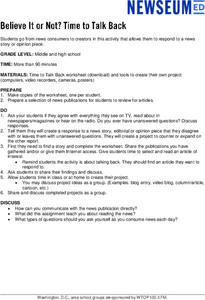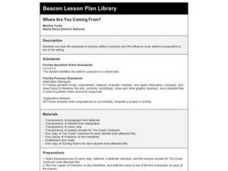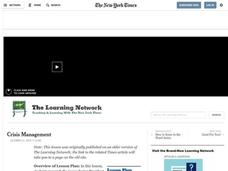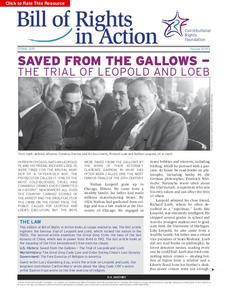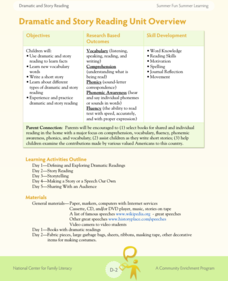Curated OER
Fact vs. Opinion (Part II)
How can you tell the difference between fact and opinion? Using newspapers, learners determine which articles contain statements of fact, and which articles reflect the writer's opinion. The lesson plan includes a discussion format and a...
Curated OER
Punctuation (The Comma vs. The Semicolon)
Explore English by participating in a grammar correcting activity. Elementary and middle schoolers distinguish when to use commas from when to use semicolons. Then they correct twelve sentences by placing commas and semicolons in the...
Curated OER
Creating a Newspaper
Get the scoop with a fun, engaging newspaper project. After analyzing the parts of a newspaper, including the headline, subtitles, and pictures or images, young journalists get to work by writing their own stories in a newspaper article...
Benjamin Franklin Tercentenary
Reading the Work of B. Franklin, Printer
Placing Ben Franklin’s ideas about a free press next to those embodied in the First Amendment sheds light on both. Learners interpret and compare two primary sources and then examine them in the light of a contemporary survey about...
Newseum
Reporting Part I: What Matters to Me
Young reporters have an opportunity to craft a news story about a topic that interests them. Class members brainstorm events and issues that affect them and possible sources of information. Individuals then select a topic, research it,...
Newseum
Believe It or Not? Time to Talk Back
Young journalists select a news story, editorial, or opinion piece that they disagree with or one that leaves them with questions. They then create their report in response and share it with the class.
Curated OER
Where Are You Coming From?
Pupils examine and discuss author's purpose and the influence of an author's perspective in his or her writing. In groups, they read scenarios and respond to them from the perspective of a designated character. Materials are attached.
Curated OER
Cartoons for the Classroom: 9/11 Revisited
Political cartoons about the September 11 terrorist attacks provide an opportunity for class members to analyze the inferences embedded in the drawings.
Curated OER
Fair Judgment
Students consider the demands of the judicial process and work in small groups to write editorials in response to the one that is read in class. For homework, they grade a television judge and write reflective essays.
Curated OER
Crisis Management
Students research the issues facing President Bush and write short political commentaries predicting what course the president take. For homework, they write editorials stating what they think the president should do to best serve the...
Curated OER
Re-Viewpoints From 2002
Students explore how editorials use various devices to convey a message to a reader. They select key news topics from 2002 and write their own editorials.
Curated OER
Propaganda Techniques
Sixth graders locate examples of persuasive writing. For this persuasive writing lesson students work in a groups to identify and analyze the use of propaganda techniques. Students use newspapers to find editorials, or advertisements,...
Constitutional Rights Foundation
Saved from the Gallows — the Trial of Leopold and Loeb
Was justice served for Bobby Franks? An informative article about the 1924 trial of Richard Loeb and Nathan Leopold includes an overview of the murder of Bobby Franks, the defense’s legal strategy, and excerpts of closing arguments from...
Constitutional Rights Foundation
Unauthorized Immigration and the US Economy
As part of a study of immigration and the U.S. economy, class members assume the role of newspaper editors to determine which submitted letters to print on their paper's editorial page to present a balanced view of the debate.
Curated OER
Journal Assignment Directions
In this journalism analysis activity, students choose and editorial article and analyze the content. Students will write articles with a minimum of 350 words.
Curated OER
Battle of the Pole Holes
High schoolers consider the relationship between business and government. In this rural electrification lesson, students read "Battle of the Pole Holes," and then write editorials that address the way that business and government...
Curated OER
Newspaper Unit: Reading Lesson Plan
Work on identifying the different parts of a newspaper with your English learners. After reviewing newspaper terminology, pupils pair up and complete a scavenger hunt, looking for specific things in the newspaper and recording their...
Curated OER
The Editorial
Students read several editorials such as those written by Upton Sinclair, Lincoln Steffens, and Ida Tarbell. They recognize the similarities between several editorials and summarize and outline the arguments presented in several editorials.
Curated OER
Political Cartoon Interpretation - (1886) American Imperialism
High schoolers analyze political cartoons. In this American Imperialism lesson, students examine "The Cuban Melodrama," and write their own interpretations of the political cartoon.
National Center for Families Learning
The Summer Fun Summer Learning Poetry Unit
Focus on poetry this summer to enhance those comprehension, fluency, and language skills with a set of resources intended to explore different types of poetry, specifically lyric poetry. The daily activities contain differentiation ideas...
National Center for Families Learning
The Summer Fun Summer Learning Dramatic and Story Reading Unit
What's the difference between story reading and story telling? Participants in a summer enrichment program learn all about the difference as they listen to famous speeches, engage in dramatic readings, and craft their own short stories...
Teaching Tolerance
Film Festival
Everybody's a critic—even your pupils! Using the included resources as a guide, screen films related to social justice and ask film enthusiasts to critique them. Publish the reviews for your school community or develop a film festival...
Annenberg Foundation
Student Voices
Whether it's an election year or not, a unit on voting patterns and political campaigns will awaken the civic pride in your high school citizens. Divided into six parts, the curriculum covers various facets of an election, including...
Curated OER
Hurricane Katrina: You Be the Reporter
Learners work in a small group to create news stories, feature stories and editorials/letters to the editor and organize them in a podcast, video-based program, or newspaper/magazine focused on Hurricane Katrina.







